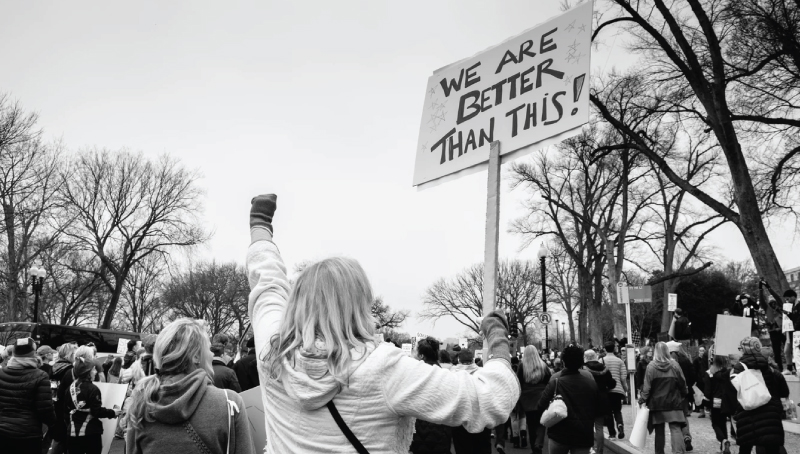
Only 5% of Canadian tech companies have a solo female CEO. Women make up only 13% of executive teams in these companies. 73% of tech companies have no female board members at all. (Source) Are you surprised? If you’re not, how do you feel about that?
Statistics on women in the workforce have changed greatly in the last 50 years, but the gender pay gap remains (and is even larger for women of colour). Women continue to hold fewer leadership roles than men, though if we look around the world, there are signs of improvement. In Canada, only 27% of our MPs are women; however, Rwanda had 63% female members of Parliament in 2016, and Bolivia came in second with 53% female MPs. Iceland had the fourth highest representation with 47% (though that number dropped to 38% in 2017), and recently passed an equal pay act with real teeth.
Women continue to lead important social movements with strength. From #MeToo to women’s marches, the world is waking up to the fact that we’ve been ignoring the reality that women around the world face for far too long. Young women are angry and unwilling to accept the treatment previous generations endured. I’m inspired to see the attention these movements are getting, and the way that they have given voices to so many previously silenced women. As the movements grow, it will be imperative to ensure we are amplifying voices from a broad spectrum of backgrounds and abilities, locations, and life circumstances.
The theme of this year’s International Women’s Day is #PressforProgress, and all around me I see Canadian charities that are fighting for women’s rights in Canada and around the world. They are staffed by activists and front-line workers who are committed to doing the hard work of fighting for a just society. These are just a few of the amazing charities in Canada that are making a difference for women.
- Half of all women in Canada will experience physical or sexual violence in their lifetime, and approximately every six days a woman is killed by an intimate partner in Canada. Indigenous women are killed at six times the rate of non-indigenous women. (Source) I’m grateful that emergency shelters and crisis support like the North York Women’s Shelter and The Native Women’s Shelter of Montreal exist for women and their families right across the country. Toronto Rape Crisis Centre/Multicultural Women Against Rape is an inclusive organization providing peer support to women who have experienced rape or sexual violence.
- When it comes to traditionally male-dominated employment fields, we’re not making enough progress. According to Women and STEM: Bridging the Divide, women make up only a quarter of STEM jobs in Canada, and as these jobs become a larger part of the economy (and demand the highest salaries), the gender pay gap will only grow. Society for Canadian Women in Science and Technology is one charity working to encourage women and girls to enter the field of STEM, while Girls E-Mentorship Innovation provides mentorship to empower young girls to reach their full potential. But it’s not just STEM roles that need attention: Camp Courage, The First Responder’s Society in Nova Scotia works to introduce young girls to careers as first responders through a camp program, and Women Building Futures in Edmonton works to empower women in the industrial workforce.
- 303,000 women worldwide died of maternal causes in 2015 (WHO), 66% of which were in sub-saharan Africa. In wealthy Canada, we still have a maternal mortality rate of 7 deaths per 100,000 live births – more than twice the rate of many areas of Europe (though half the rate in the United States where the rate has even risen since 2012!) Charities like Amref Canada, the Canadian arm of an African-based charity that works throughout sub-saharan Africa with local communities and partners to improve lives – including training more than 8,500 midwives to reduce unnecessary deaths related to pregnancy, and working with communities on Alternative Rights of Passage Programs to combat Female Genital Mutilation for upwards of 11,000 girls.
- In a world where roughly half the population menstruates, girls around the world still face significant barriers because of their periods each month. In Canada, 27% of the estimated 235,000 people experiencing homelessness each year are women, and access to hygienic facilities and supplies during their periods is a real challenge (women’s shelters are always in need of menstrual and other hygiene supplies). Internationally, charities like Mother Nature Partnership, which provides reusable products and menstrual health care information to women and girls in Cameroon, and The Red Elephant, which partners with local communities in Africa to teach women to source and sew reusable menstruation products for their own use and as a business opportunity, are trying to address these issues.
It’s easy to feel overwhelmed by statistics, but the surest way to overcome feelings of powerlessness is to take action. Everywhere I look, there are small charities making lives better and this is certainly true of charities supporting women. I hope you’ll use this International Women’s Day as an opportunity to reflect on the actions you’re taking in your own life to #PressForProgress, and consider getting involved in a local charity that is fighting to make our world a better place.
Leave a Reply